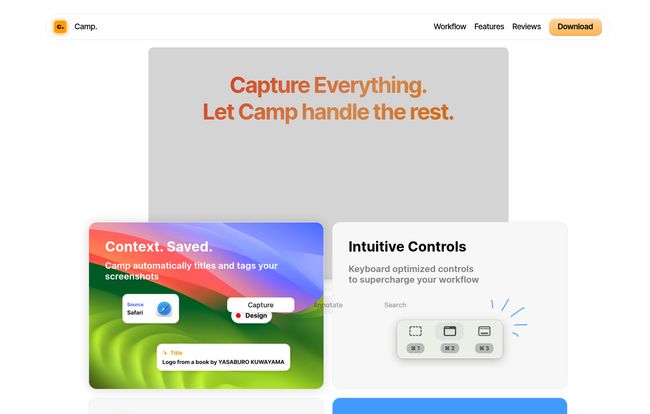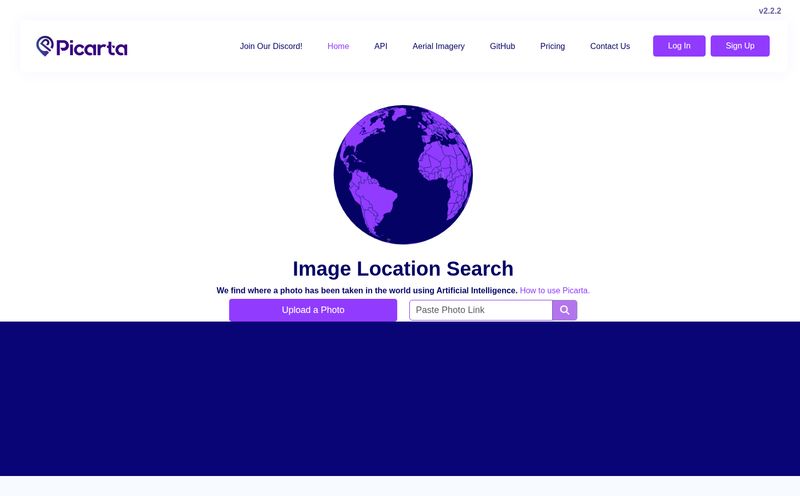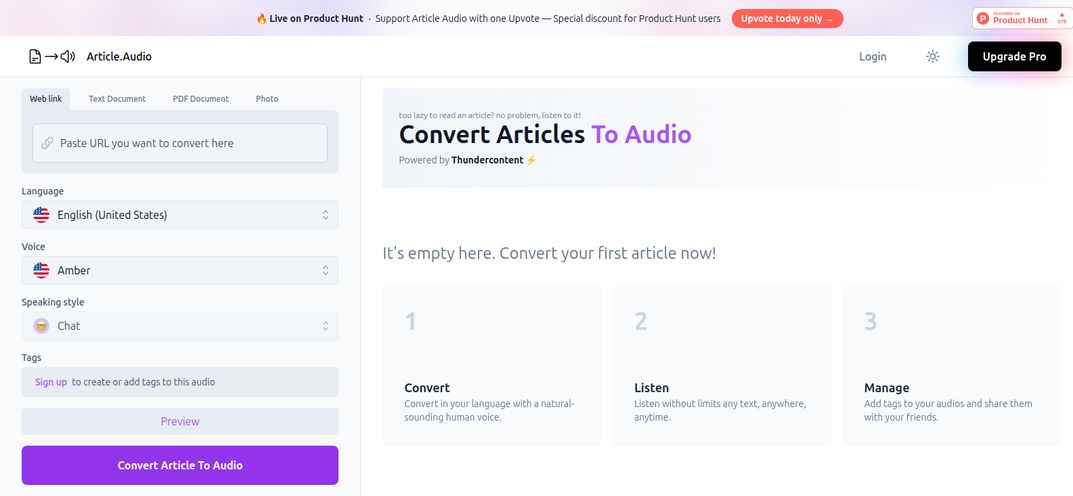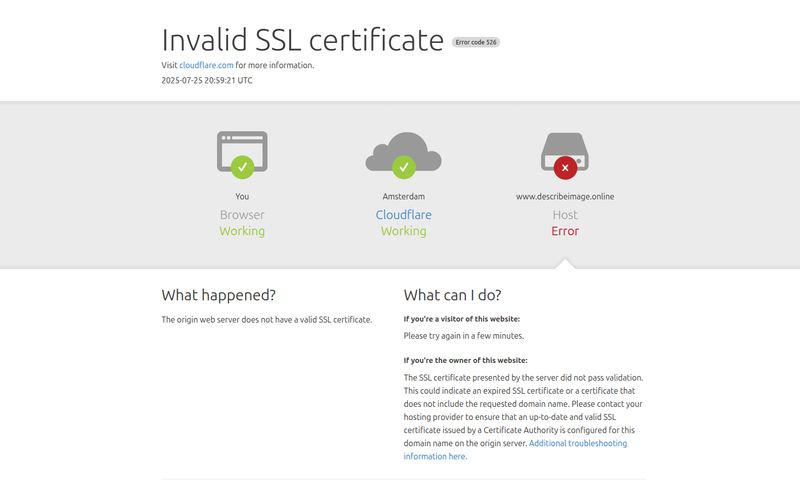Open up your Desktop or your iPhone’s Photos app right now. Go on, I’ll wait. What do you see? If you’re anything like me, you’re staring into a digital abyss, a chaotic mess of screenshots I like to call the “Screenshot Graveyard.” It's where good ideas, funny memes, and crucial bits of information go to die. Receipts, snippets of code, a stranger’s brilliant tweet, that one couch you swore you’d buy... all captured in a fleeting moment of purpose, now lost to the sands of time (and a terrible file naming system like Screen Shot 2024-10-26 at 11.41.03 AM.png).
We’ve all been there. We tell ourselves we’ll sort them later. We'll tag them, file them, turn them into actionable tasks. But we never do. It's one of the great lies we digital packrats tell ourselves. For years, I’ve relied on a patchwork system of renaming files, elaborate folder structures, and, frankly, just giving up. Then I stumbled upon a new tool called Camp, and it felt like someone finally understood my pain.
So, What Exactly is Camp?
On the surface, Camp is a screenshot tool for macOS and iOS. Big deal, right? Both operating systems have that built-in. But that's like saying a car is just a metal box with wheels. Camp’s whole premise is what happens after you press ⌘ + ⇧ + 4. Its tagline is “Capture Everything. Let Camp handle the rest,” and from what I’ve seen, it’s not just marketing fluff.
Camp doesn’t just take a picture of your screen. It’s like a little detective that instantly analyzes the image, using some clever OCR (Optical Character Recognition) to pull out all the useful bits. It reads the text, identifies people or locations, and automatically titles and tags the screenshot for you. Suddenly, that picture of a book cover isn’t just a static image; it’s a searchable file titled “Logo by YASABURO KUWAYAMA.” It turns your screenshot graveyard into a living, breathing, and most importantly, searchable library.

Visit Camp
The Features That Actually Make a Difference
I’ve seen a million productivity apps that promise to change my life. Most of them just add another layer of complexity. Camp, however, seems focused on a few core things and doing them exceptionally well. Its a small thing, but that focus is what makes it powerful.
Automatic Context is the Real Magic
This is the headline feature for me. The “Context. Saved.” thing. Taking a screenshot of a website in Safari? Camp automatically knows the source URL and the page title. Snapping a picture of a map? It can pull out the location data. This is the stuff that saves you the mental energy of having to remember why you took a screenshot in the first place. It’s like having a tiny, obsessive librarian living in your Mac, automatically cataloging every visual note you take without you even asking. Mike Wadhera, a name some of you might recognize, called it a “game-changer,” and I’m inclined to agree. It’s the difference between a tool and a solution.
Blazing-Fast, Local Search
What good is all that automatically-saved context if you can’t find it? Camp’s search is, as advertised, instant. Because it’s already processed all the text within your images, you can search for a single word buried in a paragraph you screenshotted weeks ago and it just… pops up. This transforms screenshots from a 'write-only' medium to a genuinely useful reference archive.
Privacy First, Always
Okay, here’s the big one for me, and probably for you too. An app that reads all my screenshots? My first thought was, “where is all that data going?” In an age where every click seems to be feeding some massive AI model in the cloud, Camp’s approach is a breath of fresh air. All your data is kept locally. Period. That’s it. Nothing is sent to their servers. It’s your data, on your machine. This is a massive trust signal and, honestly, a non-negotiable for any tool that has access to potentially sensitive information.
Little Tweaks for the Power Users
Beyond the big-ticket items, there are small touches that show the developers actually use their own product. You can pin favorite screenshots for quick access, which is great for things you need to reference repeatedly throughout a day. And, of course, there’s Hot Key support (⌘ + ⇧ + V is the default). As someone who lives by keyboard shortcuts, this is essential. It's these thoughtful details that separate good apps from great ones.
My Take: Is Camp a True CleanShot X Killer?
Now, the elephant in the room for many Mac power users is CleanShot X. It has been the undisputed king of screenshot tools for years. So, how does Camp stack up?
In my opinion, they’re solving slightly different problems. CleanShot X is the Swiss Army Knife of capturing and annotating. Its annotation tools are second to none, and for creating quick guides or blurring information, it’s still my go-to. Camp, however, is all about organizing and retrieving. Its strength isn't in fancy arrows and markup tools; it’s in making sure you can find that one screenshot of a GraphQL query from three months ago in under five seconds.
Could they coexist? Absolutely. You could even use CleanShot to capture and Camp to organize. But as Faraz Khan noted in his testimonial, screen capturing tools have been pretty much the same for a long time. Camp feels like the first real evolution in the management side of the equation.
"This app saves me so much time it's incredible. Plus, Camp has finally helped me get my screenshots organized. Now, my library is filled with things I have found and saved from various corners of the internet." - Olina Chau
The All-Important Question: What's the Price?
Here’s the rub. As of right now, I can’t find any pricing information on their website. There’s a 'Download' button, but no clear indication if it's a one-time purchase, a subscription, or a free beta. This is a bit of a head-scratcher. My gut tells me this will likely be a paid product, probably a subscription model given the trend in software, but that's pure speculation. For now, it seems you can download it and give it a whirl without pulling out your credit card. Let’s hope they clarify this soon.
FAQs About the Camp Screenshot App
Is Camp better than the built-in macOS screenshot tool?
In a word, yes. The built-in tool is fine for a simple capture, but it does nothing to help you organize or find screenshots later. Camp's value is in its automatic OCR, tagging, and search capabilities, which turn your screenshots into a useful, searchable database. They're in different leagues.
How accurate is the text extraction (OCR)?
Based on the information available, the accuracy depends on the quality of the screenshot. For clear, standard text on a screen, it should be highly accurate. For blurry images, handwritten notes, or very stylized fonts, your mileage may vary. This is typical for most OCR technology today.
Is my data safe with the Camp app?
Yes. One of Camp's core features is its commitment to privacy. The website explicitly states that all your data, including the screenshots and the extracted text, is kept locally on your device and is never sent to the cloud or their servers.
What platforms is Camp available on?
Currently, Camp is available for macOS and iOS. This makes it a great solution for those who are fully in the Apple ecosystem, as you can manage screenshots from both your computer and your phone.
Is Camp free to use?
The pricing model is not currently specified on their website. You can download and use the app, but it's unclear if it's a free trial, a freemium model, or if a payment structure will be introduced later.
Final Thoughts: A Glimmer of Hope for Digital Hoarders
I’m genuinely excited about Camp. It’s a beautifully designed, thoughtfully crafted tool that tackles a real, nagging problem for so many of us. It’s not trying to be everything to everyone. It wants to do one thing: make your screenshots smart. By focusing on privacy, automatic organization, and fast search, it’s building a powerful case for itself in a crowded market.
Will it single-handedly tidy up my digital life? Probably not. I'm a lost cause. But it might just be the tool that finally brings order to the chaos of my screenshot folder. And for that alone, it's worth a look. The future of productivity is less about adding more features and more about adding intelligence to the things we already do. Camp seems to get that perfectly.



